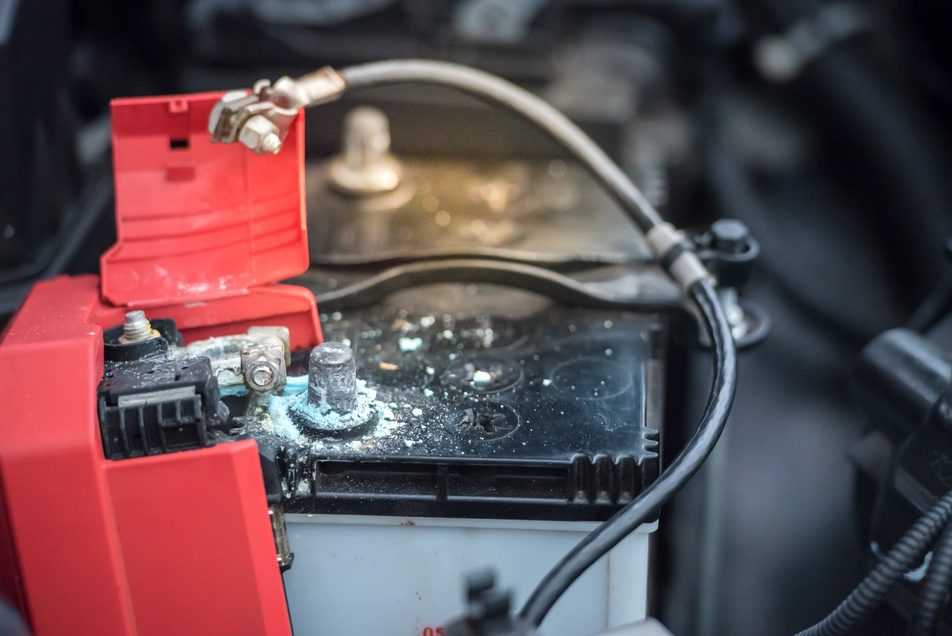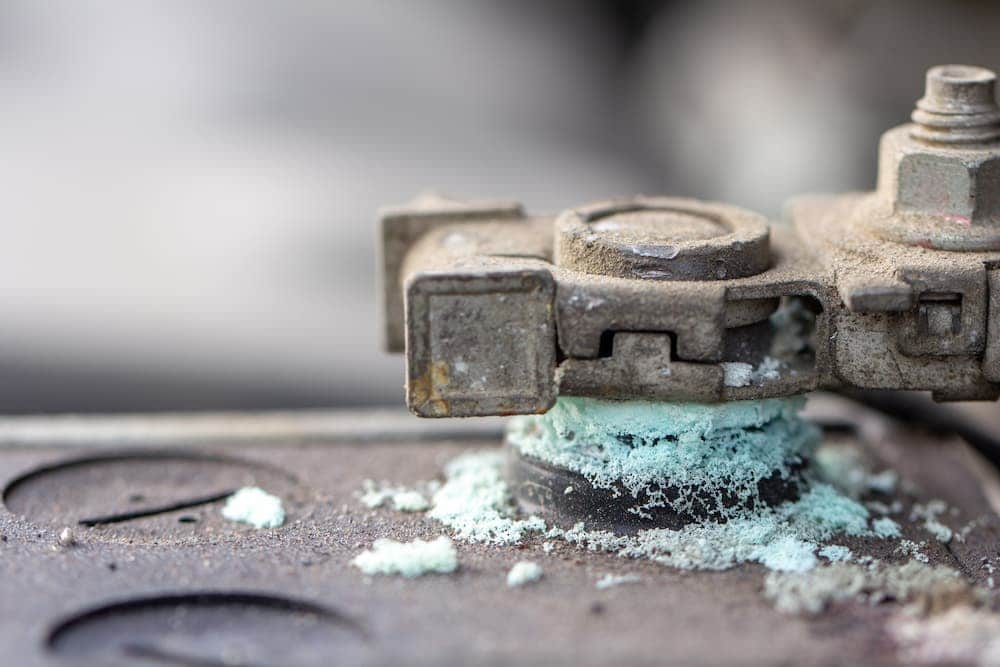Car battery corrosion is a common issue that many vehicle owners encounter. Do you know, what causes car battery corrosion? Corrosion on car batteries is primarily caused by hydrogen gas being released from the battery acid. This gas reacts with other components, leading to corrosion.
The buildup of corrosion can lead to various problems, such as reduced battery efficiency and potential starting issues. Hydrogen gas, released from the battery acid during normal operation, reacts with the surrounding metal parts.
This reaction forms a corrosive substance, often seen as a white or bluish powder on the battery terminals. Regular maintenance and cleaning can help prevent significant damage and ensure your car battery remains in optimal condition. Understanding the causes of corrosion can help vehicle owners take proactive steps to maintain their battery’s health.
What Causes Car Battery Corrosion-Common Reason
Car battery corrosion can lead to many problems. Understanding the common causes helps prevent issues. Corrosion can shorten battery life and reduce performance.
Leakage Of Electrolyte
Electrolyte leakage is a common cause of car battery corrosion. The battery contains a mixture of water and acid. This mixture can leak out and cause damage. Leaks occur due to overcharging or physical damage.
When the electrolyte leaks, it forms a crusty build-up. This build-up can be white, blue, or green. The crusty substance is corrosive and can damage battery terminals. Regular inspection can help identify leaks early.
Chemical Reactions
Chemical reactions inside the battery are another cause of corrosion. The battery terminals are made of metals like copper and lead. These metals react with the electrolyte. The reaction creates a by-product that forms on the terminals.
Temperature changes can speed up these reactions. High temperatures increase the rate of corrosion. Keeping the battery clean can help slow this process. Regular cleaning of terminals is essential.
| Cause | Details |
|---|---|
| Leakage of Electrolyte | Overcharging and damage cause leaks, leading to corrosion. |
| Chemical Reactions | Metal reactions with electrolyte create corrosive by-products. |

Credit: www.customcompleteautomotive.com
Battery Age And Wear
Battery age and wear are crucial factors in car battery corrosion. As batteries get older, they become more prone to issues. Understanding these factors can help in maintaining battery health.
Old Battery Issues
An old battery has a higher chance of developing corrosion. Over time, the battery’s internal components degrade. This degradation can cause the release of gases. These gases lead to the buildup of corrosive materials on the terminals.
The older the battery, the more likely it is to leak. Leaks allow corrosive chemicals to escape. These chemicals contribute to terminal corrosion.
Signs Of Wear
Recognizing the signs of battery wear can prevent corrosion. Common signs include:
- Slow engine crank
- Dim headlights
- Frequent need for jump-starts
- Swollen battery case
If you notice these signs, your battery might be wearing out. Pay attention to the battery’s physical state. Look for visible corrosion around the terminals.
| Sign | Indication |
|---|---|
| Slow engine crank | Battery struggling to start the car |
| Dim headlights | Low battery power |
| Frequent jump-starts | Battery losing charge quickly |
| Swollen battery case | Overheating or overcharging |
Regularly inspect your car battery. Take note of any unusual signs. Early detection of wear can help prevent corrosion.
Environmental Factors
Car battery corrosion is a common issue. Various environmental factors contribute to it. Understanding these factors helps in preventing corrosion. Let’s discuss two major environmental factors that impact car batteries.
Weather Conditions
Weather conditions significantly affect car battery life. Extreme temperatures are harsh on batteries. During hot weather, the battery fluid evaporates. This leads to corrosion around the terminals. Cold weather can also be harmful. Batteries have to work harder in cold conditions. This strain can lead to corrosion over time.
Humidity Levels
Humidity levels play a critical role in battery health. High humidity accelerates the corrosion process. Moisture in the air can mix with battery acid. This creates a corrosive environment. Low humidity is less problematic. But, it can still cause minor corrosion.
Overcharging And Undercharging
Car battery corrosion can have many causes. Two major factors are overcharging and undercharging. Understanding these can help you maintain your battery better. Let’s dive into how each affects your car battery.
Effects Of Overcharging
Overcharging a car battery means you are giving it too much charge. This can cause a chemical reaction inside the battery. The battery acid starts to boil, releasing hydrogen gas. This gas can then mix with other substances, leading to corrosion.
Overcharging also heats up the battery. The heat can damage the battery plates. Damaged plates can leak acid. This leaking acid causes more corrosion. Over time, this can reduce the battery’s life.
| Effect | Description |
|---|---|
| Gas Release | Hydrogen gas mixes with substances to cause corrosion. |
| Heat Damage | Heat damages plates, leading to acid leaks and more corrosion. |
Consequences Of Undercharging
Undercharging means the battery does not get enough charge. This can lead to the build-up of lead sulfate on the battery plates. Lead sulfate build-up can cause corrosion and reduce battery efficiency.
Undercharging also means the battery is not fully charged. A partially charged battery can freeze in cold weather. This freezing can damage the battery and cause more corrosion.
- Lead Sulfate Build-Up: Causes corrosion and reduces efficiency.
- Freezing: Partially charged batteries can freeze, leading to damage.
Poor Battery Maintenance
Car battery corrosion is often caused by poor battery maintenance. Regular upkeep can prevent many issues. Here, we discuss two key areas: neglecting regular cleaning and improper handling.
Neglecting Regular Cleaning
Regular cleaning is vital for battery health. Dirt and grime can cause corrosion. Follow these steps to clean your battery:
- Turn off the engine.
- Disconnect the battery terminals.
- Use a brush to clean the terminals.
- Rinse with water and dry completely.
Make sure to clean your battery every few months. This simple task can extend its life.
Improper Handling
Improper handling can also lead to battery corrosion. Always handle the battery with care. Here are some tips:
- Wear gloves to protect your hands.
- Lift the battery with both hands.
- Avoid dropping or bumping the battery.
Proper handling helps prevent cracks and leaks. These issues can cause corrosion quickly.
Remember, good battery care is essential. Keep it clean and handle it properly to avoid corrosion.

Credit: www.hallmarkhyundainorth.com
Battery Terminal Corrosion
Battery terminal corrosion can disrupt your car’s performance. This corrosion appears as a white, ashy substance around the battery terminals. Understanding what causes this corrosion and how to prevent it is crucial for maintaining your car battery’s health.
Causes Of Terminal Corrosion
Several factors can lead to battery terminal corrosion. These include:
- Electrolyte Leakage: Battery acid leaks cause corrosion on terminals.
- Overcharging: Overcharging creates excessive heat, which can corrode terminals.
- Age of the Battery: Older batteries are more prone to corrosion.
- Climate: Humid and hot climates accelerate corrosion.
The table below summarizes these causes:
| Cause | Description |
|---|---|
| Electrolyte Leakage | Battery acid leaks corrode the terminals. |
| Overcharging | Excessive heat from overcharging leads to corrosion. |
| Age of the Battery | Older batteries have higher corrosion risk. |
| Climate | Hot and humid climates speed up corrosion. |
Preventing Terminal Corrosion
Preventing battery terminal corrosion involves a few simple steps:
- Regular Cleaning: Clean terminals with a baking soda and water mix.
- Proper Charging: Use a quality charger to avoid overcharging.
- Battery Maintenance: Inspect the battery for any signs of leakage.
- Terminal Protection: Apply a thin coat of petroleum jelly to the terminals.
Following these steps helps keep your car battery in top condition. Regular maintenance ensures a longer battery life and better vehicle performance.
Impact Of Corrosion On Vehicle Performance
Corrosion on your car battery can cause serious problems. It can affect how your car performs. Corrosion happens when acid leaks from the battery. This acid reacts with the metal terminals. The result is a build-up of white, ashy substances. This can lead to many issues with your car’s performance.
Starting Issues
Corrosion can make it hard for your car to start. The build-up on the battery terminals can block the flow of electricity. This means your car won’t get the power it needs. You might hear a clicking sound when you turn the key. This is a sign that the battery is not sending enough power to the starter motor. Regular cleaning of the terminals can help avoid this problem.
Electrical System Problems
Corrosion can also cause issues with your car’s electrical system. The battery powers many parts of your car. These include the lights, radio, and air conditioning. Corrosion can lead to poor connections. This means these parts might not work properly. You might notice flickering lights or a weak radio signal. Cleaning the battery terminals can help keep these parts working well.

Credit: stevesautorepairva.com
Preventing Car Battery Corrosion
Preventing car battery corrosion is crucial for vehicle maintenance. Corrosion can cause battery issues and even car breakdowns. Implementing simple preventive measures can extend your battery’s life.
Regular Inspection Tips
Regularly inspecting your car battery helps in early corrosion detection. Follow these tips for effective inspection:
- Check battery terminals every month.
- Look for any white, ashy substance.
- Ensure cables are tightly connected.
- Inspect for any cracks or leaks.
Using Protective Products
Using protective products can minimize the risk of corrosion. Here are some effective options:
| Product | Benefits |
|---|---|
| Anti-corrosion spray | Prevents build-up on terminals. |
| Battery terminal protectors | Guards against moisture and acid. |
| Petroleum jelly | Simple and cost-effective. |
Apply these products as part of your regular maintenance routine. This can significantly reduce corrosion risk.
Conclusion
Avobe we discuss what causes car battery corrosion? Understanding the car battery corrosion, now you can save your time and money. Regular maintenance prevents issues and extends battery life. Keep terminals clean and secure to avoid corrosion. A proactive approach ensures your car runs smoothly. Prioritize battery care for reliable performance and longevity.

